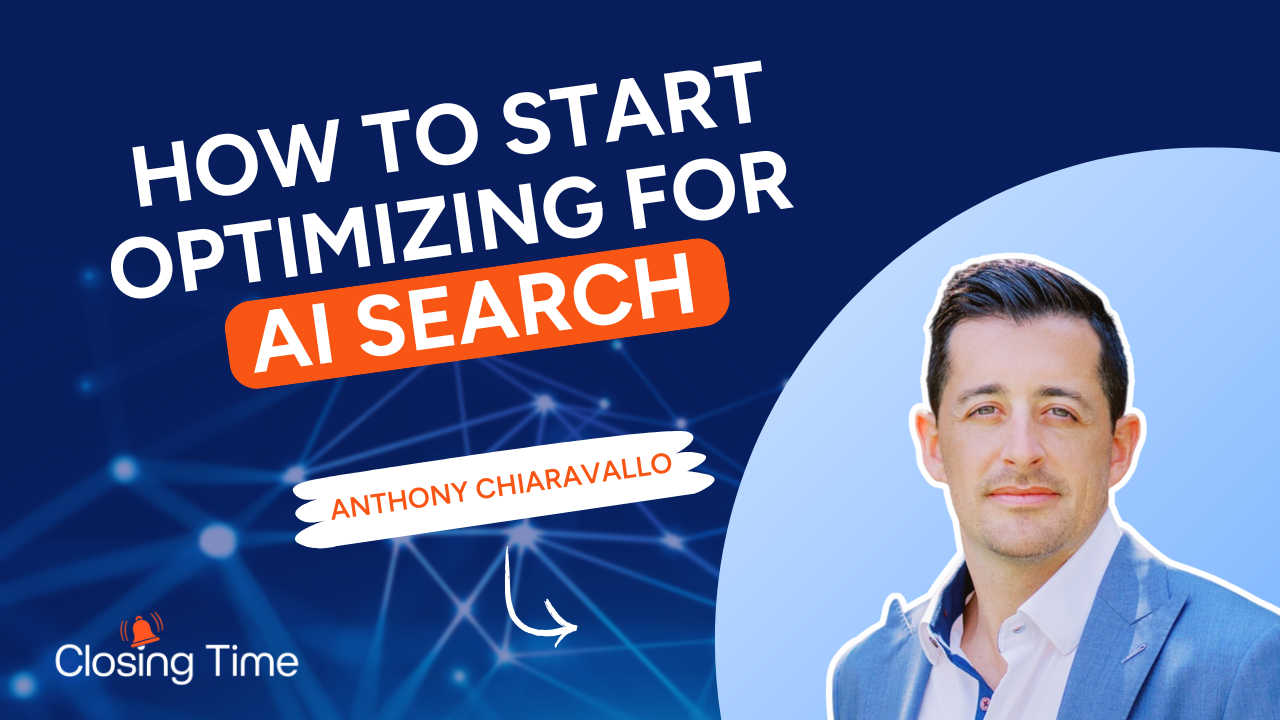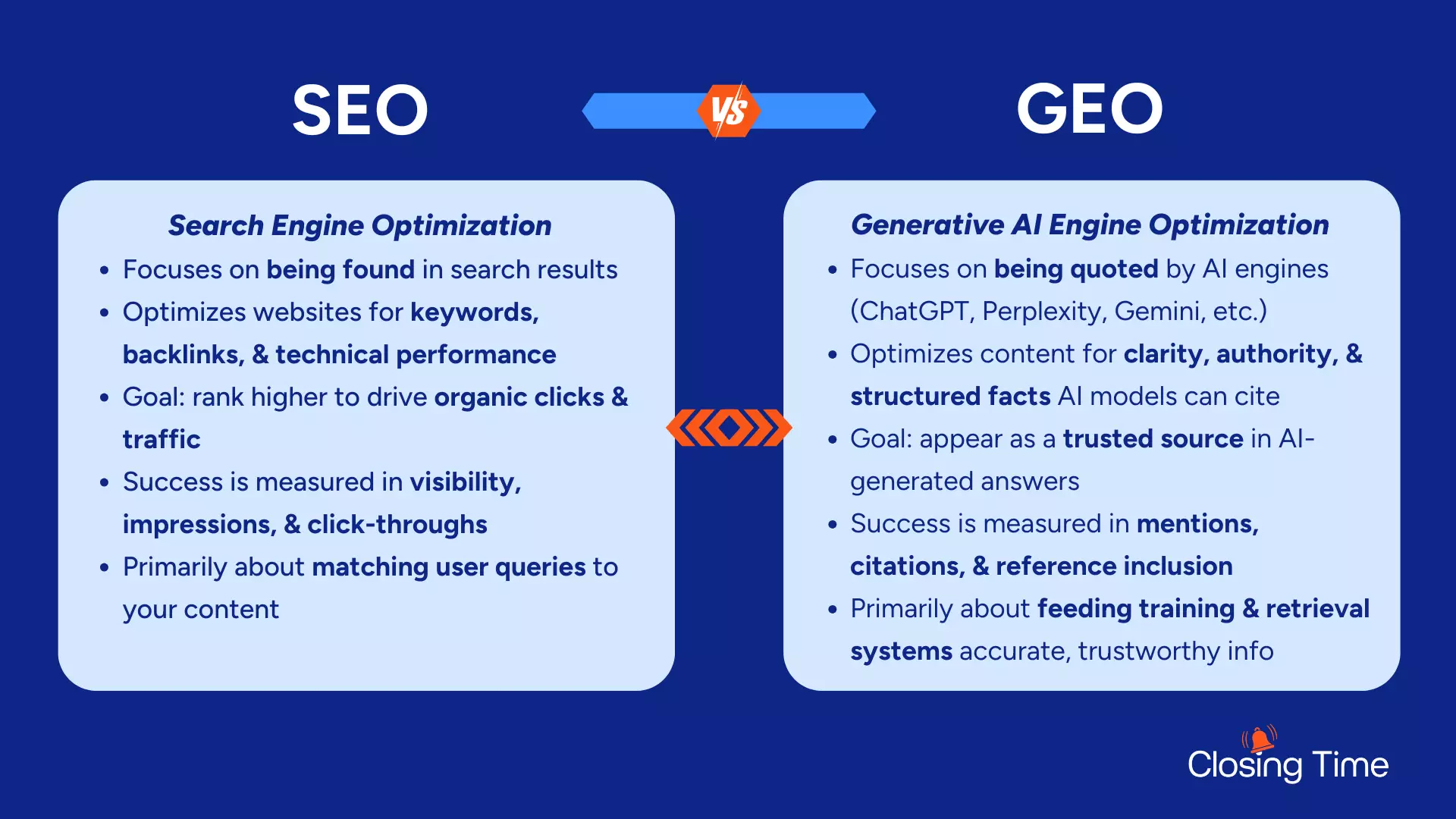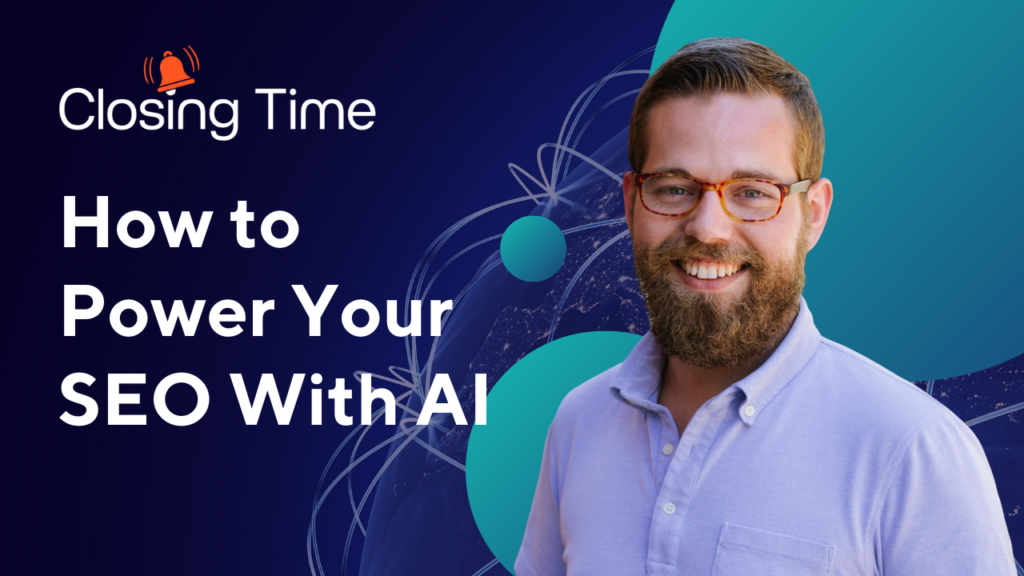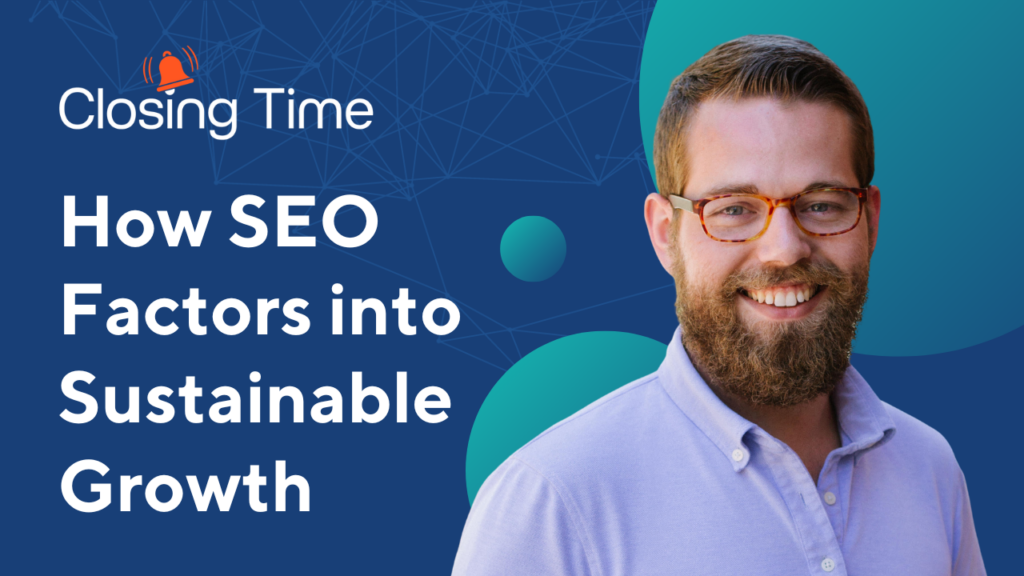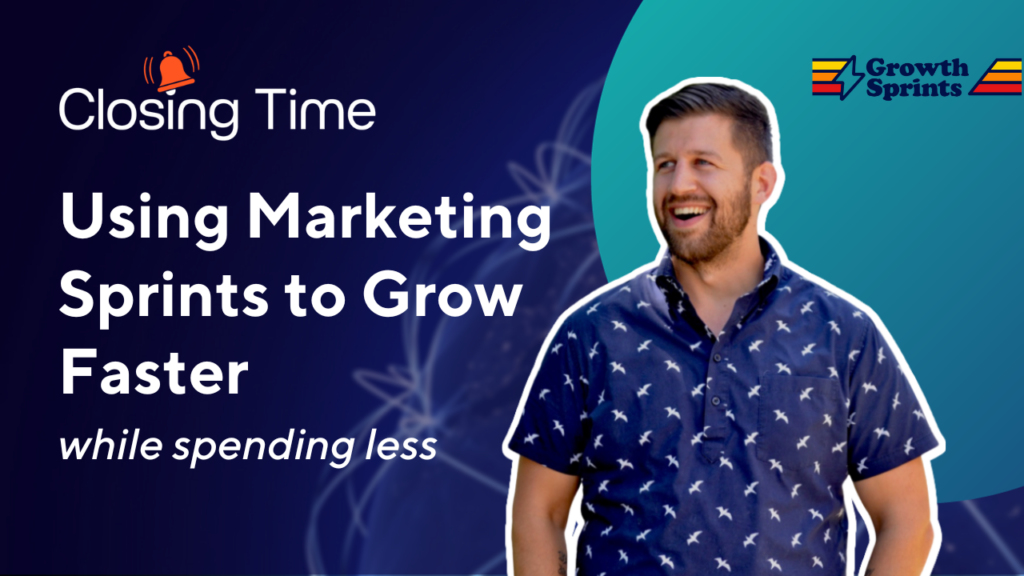Marketers have been doing SEO for seemingly decades
now, but are you ready to optimize for AI?
Let’s dig into it.
In this episode of Closing Time.
Thanks for tuning in to Closing Time, the show for go to market Leaders.
I’m Val Riley, head of marketing for Unbounce, Insightly CRM and LeadsRx.
Today I am joined by Anthony Chairavallo.
He is CEO of Vallo. Media, a marketing firm.
Anthony, welcome to the show.
Thank you, Val. Great to be here.
So let’s dig right into this topic.
I have to say, it’s a super hot topic on my team right now.
And even though AI search volume
is only about 2.5% of total search,
I feel like we think those numbers are going to be climbing.
Is it too soon to talk about optimizing for AI search?
So it’s not too soon at all.
If anything, it’s really the perfect time.
And so I like to compare it to the early days of mobile search.
At first it was, you know, small slice of the pie, but within a few years
it became the default way that people look things up.
And so we’re going to see the same thing here with AI search.
And once people experience the convenience
of getting like more of a direct conversational answer
instead of sifting through, you know, ten blue links, it’s kind of hard to go back.
And so the number that you cited, that 2.5%, it may sound small,
but that’s literally millions of searches every single day
that are already happening in this format.
And so that number is going to climb really fast as tools like Google, Gemini
and Perplexity, ChatGPT, integrate
more seamlessly into daily search habits.
And so marketers who are already thinking about AI optimization are going to be
the ones with a serious head start when this becomes even more mainstream.
I love that.
That’s very validating for our team right now.
I really do like the parallel you painted there,
because obviously Unbounce is in the landing page business.
And when we look at optimization for landing pages on mobile,
you’re totally right.
It was an afterthought initially.
And now you look at the percent of search
of of landing page traffic that comes from mobile devices.
And in some industries it’s, it’s more than half.
So, a really good parallel to paint there.
So let’s zero in on the terminology question,
because I’ve heard this area of specialization called
AI engine optimization, which is a little hard to say.
And I’ve been hearing GEO, which stands for generative AI Engine Optimization.
What terminology have you heard?
Where do you think we’re going to land?
So yeah, it’s a really good point.
There’s been quite a few terms thrown around already,
but the one that is most common right now is the GEO
which stands for generative engine optimization.
And I like that term because it’s a useful distinction,
because SEO, you know, as your listeners may know, it’s always been about ranking
and a list of links, whereas GEO is about something very different, making
sure your content is cited, referenced and woven directly into the AI answer.
And so the best way to think about it is it is this way SEO is about
being found, whereas GEO is about being quoted.
And so when an AI gives someone an answer to
what is the best wine subscription or how to plan a trip to Maine,
you want your brand to show up inside that synthesized response.
And so that’s actually a big shift.
And it’s why we’re calling this GEO.
And you know, for me,. I’ve been in marketing 18 years.
I’ve seen a lot of shifts over the years.
Social mobile, programmatic, you name it.
But what’s happening right now
with AI search, it just feels bigger than any of those.
We’re moving from a world of clicking links
to a world where the answer is just given to you,
and that completely changes how brands need to show up.
And so that’s why this concept of GEO is so exciting.
It’s not, you know, just this evolution of search.
It’s the next iteration of SEO, and it’s a completely new playbook
for how marketing can work in an. AI first world.
Yeah, it’s almost exciting, really, where we have been
in this game for so long about rankings and really
there are some players that have had this advantage
for years, and it’s almost like this is a new frontier
where brands can compete in a new way, which I think is pretty exciting.
Along that line, it seems to me the research that I’ve done
is that AI search engines, they have this recency bias.
I saw one statistic that said that 95%
of what ChatGPT is offering up is based on,
published data that is less than ten months old.
So that doesn’t bode well out there for content marketers
who might have some decay in content on their hands.
How do you see the recency bias working for or against marketers?
So that’s a great question.
And honestly it’s one of the biggest shifts.
So with traditional SEO you could write an amazing evergreen article.
And if it was well optimized it might sit at the top of Google for years.
And so AI search is to your point much more biased towards recency
and the freshness and the relevance to the current moment
is really more important than ever.
And so this is really a fundamental,
mindset, shift that has to change.
You can’t just set it and forget it.
And content has to be this living and breathing thing.
It’s updated, refreshed, republished regularly.
It’s honestly for marketers, it’s more like running a newsroom
or a magazine than just writing a static guide.
And this means that marketers will need to invest, you know, more time
and resources in continuous content creation
and updates, and not just these sort of one off projects.
Yeah, it’s making me think that, like having those 10 to 15
or maybe 50 content pieces and just like putting them
on a rotation of constant updates is probably a really good investment.
Rather than always trying to generate a bunch of new content
that might get farther and farther away from your core message.
That’s just one philosophy.
You know, the stuff that keeps content marketers up at night.
That’s just one approach.
I was like, well, maybe that’s the right approach, but it’s truly exciting times
because, you know, we all we all can just, you know,
explore new areas, new ways to kind of crack the code on these engines.
So, and you could see it as exciting or, or frightening.
Absolutely. Yeah.
So sites like, Wikipedia, Reddit and Forbes
So sites like, Wikipedia, Reddit and Forbes
I have discovered are favorites for ChatGPT.
I’ve also seen some of these engines favoring Quora, YouTube,
and even LinkedIn.
So it really those are places where content marketers
So it really those are places where content marketers
maybe didn’t necessarily focus on in the past.
What does that mean for marketing teams and agencies?
Yeah.
So basically it means your brand can’t live in isolation anymore, right.
It’s not just about your corporate blog or your website anymore.
If you’re a content marketer, it’s about your brand showing up across
the digital ecosystem where conversations are happening.
Now, recently, hrefs did a study of over
75,000 brands and found the number one predictor
of showing up in AI answers was not backlinks or even rankings.
It was branded mentions across the web.
And so if people are talking about you on LinkedIn, if your research
gets picked up in Forbes, if your insights are quoted on Reddit or Quora,
that’s what the AI is going to notice and also surface.
And so GEO pushes marketers to think beyond SEO in the traditional sense.
Things like PR, thought leadership,
partnerships, podcast, guest content, all of that suddenly becomes central
to your search strategy,
and you want to be part of the conversation everywhere AI is looking.
Got it.
I’ve also seen a little talk about formatting, that AI,
and if you think about the results that it serves up, this sort of this
definitely tracks that GEO or AI search favors
content that has concise summaries, short, intricate
introductory paragraphs, even bulleted content FAQs.
So this sounds like a big adjustment for content teams.
Absolutely.
So AI models love structure, so the easier
you make your content to parse, the more likely it is to be cited
that means, to your point, like you said, short intros that get right to the point.
Bulleted lists FAQ sections.
Key takeaways.
It’s almost as if your brand is writing a briefing note for a busy executive.
They don’t have time for fluff.
And so what you really want is the essence that’s clearly packaged.
And you know, AI is exactly the same way.
So when your content is structured like that,
you’re not just helping the AI, you’re helping the human readers too.
And so it’s it’s basically a win win.
It’s more scannable for humans and it’s more digestible for machines.
And you need to put yourself in the mindset of your audience.
You know, what kind of questions are they asking?
How can we provide better answers to those?
And that’s
what’s really going to help your brand, you know, show up in these responses.
Boy, that’s a really good way to think of it.
You’re briefing an executive.
It’s almost like the Tldr concept, but like in all of your content pieces.
Yeah, exactly.
You alluded to backlinks just earlier, and I want to touch on that again,
because it seems like backlinks are maybe lessening in importance.
You know, we used to focus so much on the actual link,
but it seems like having other websites talk about
your content is really what’s important now, rather than that specific link.
Exactly. Right.
So backlinks,
they’re still part of the picture, but they’re not the star of the show anymore.
So in the world of GEO backlinks are becoming a secondary signal.
What really moves the needle are the branded mentions and branded anchor text.
So in fact those had the highest correlation
with being cited in AI answers.
And so instead of obsessing over
domain ratings and building links, just for the sake of it,
I tell marketers focus on increasing your brand visibility.
Get people searching for you
by name, get mentioned in the press, get cited by other creators.
That’s the modern equivalent of link building for AI search.
Gosh, it’s such a relief because the the actual logistics
of backlink building and backlink trading was just really a hardship.
And sort of made me think, well, is this really worth the time and effort?
And I’m sort of glad we’re shifting away from that.
So another winning strategy seems to be original content
and, particularly research, which is exciting.
So I feel like this is, really a call out to marketers to start producing,
original research and publishing it and and putting it out in the ether.
Do you agree in that strategy?
I absolutely agree, and I love this because I came from PR agencies.
I built performance marketing teams within the world’s largest PR agencies,
and so original research is like rocket fuel for GEO.
And that’s a big part of what PR agencies do.
And so I engines are scanning the web for authoritative, unique sources.
And when you publish data that no one else has, you become that source.
This could be, for example, a customer survey,
proprietary usage data, and industry benchmark report.
If you can own a data set, you’ll get picked up
not just by media outlets, but also by the AI summaries
that want to cite the best possible reference.
And so, you know, just for example, at Vallo Media,
we’ve helped clients turn their internal data into public
facing insights that got picked up in big publications.
And that kind of work
is going to be even more valuable in the. AI first search world.
It sounds like PR firms are coming back front and center again,
which is great because I think the work they do is amazing.
And, and now we’ll have a whole, you know, another area for them
to really dig into, to help them with AI search results or GEO.
Anthony, that’s at the end of our time together.
I do want to see if you could sum up for, for the marketers out there listening,
what would be your message to them right now about GEO.
I would say, you know, think about this strategically.
Don’t just do something
because it’s a trend or because you heard about it somewhere.
Really think about okay, what is our strategy
and what are the implications for our business and our brand.
And then, you know, go back and say to yourself, you know, what’s old
is new again, like all of these. PR strategies that have been deployed for
for decades are becoming even more important and more relevant.
So, you know, take the time to pull together
a strategy and really think through, your PR, your thought leadership
and how your content marketing can evolve in this new world.
All right.
So it sounds easy enough, but if people need help
with something like that, how could they reach you in your firm?
Yeah.
So the best place is our website. Vallomedia.com.
And we share case studies, insights and strategies for brands
that want to stay ahead of the curve.
And I’m also very active on LinkedIn, where I share trends
and practical advice about performance, marketing, AI, and now GEO.
And so if any of your listeners
need help with marketing, definitely connect with me there.
Nice.
I feel like we’re going to look back on this episode in a year
or two and be like, oh, that was the start of something huge.
So I’m really glad we were able to bring you in and talk about the topic today.
Thank you Anthony.
Thank you.
And thanks to all of you for tuning in to Closing Time.
Remember, you can get this episode delivered
right to your inbox if you just click the link in the show notes and we’ll see
you next week.

